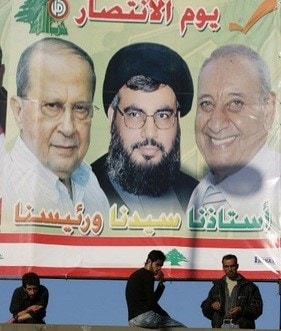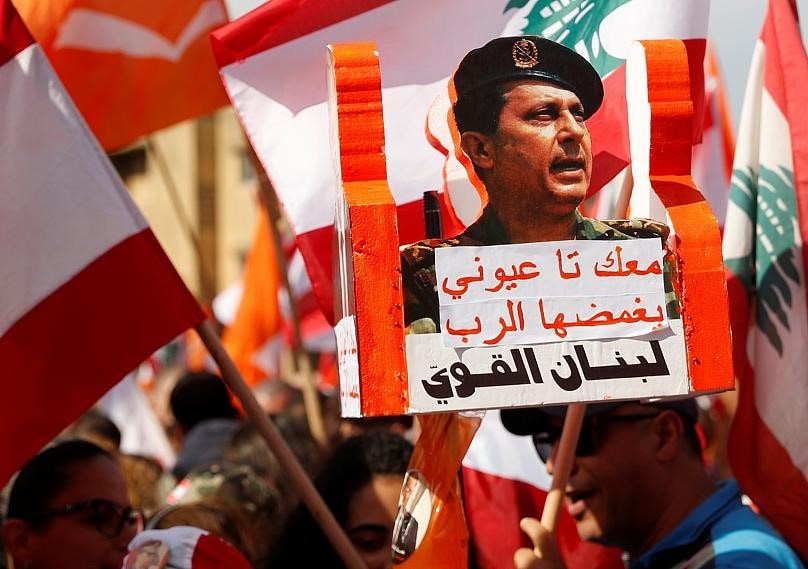October is a fateful month for Michel Aoun. Four years ago this month he was elected Lebanon's president by the country's parliament. Thirty years ago this month, he survived an assassination attempt, and was later forced out of the Lebanese Presidential Palace by an invading Syrian Arab Army supported by allied Lebanese militia.[1] That was the end of two years of Aoun serving as interim Lebanese prime minister ruling over mostly Christian-populated parts of East Beirut and Central Lebanon. Aoun's career recalls that of France's Marshal Petain, a World War One hero turned World War Two villain, a man of consequence certainly, but much of it bitter.[2]

Today derided by activists – with considerable evidence – as senile and bumbling, Aoun was once a military hero. During the Lebanese Civil War, he is best remembered for his leadership in 1983, during the battle of Souq Al-Gharb, when his 8th Infantry Brigade of the Lebanese Armed Forces (LAF) held off repeated attempts by Syria-supported Druze and Palestinian militiamen to take that strategic hill town. Aoun's victory was helped immeasurably by naval artillery from the U.S. 6th Fleet off Lebanon's coast. Aoun's unit was mostly Christian, but included soldiers from Lebanon's other faiths as well, so at the time then Brig.-Gen. Aoun was not seen as a particularly sectarian figure.
With Syria's allies in Lebanon blocking the selection of a new president, outgoing President Amin Gemayel took the constitutional but unusual step in September 1988 of naming an interim military government, placing it under then-LAF Commander Aoun whose primary role would be to engineer the selection of a new president. It would be a fateful decision, fateful certainly for Aoun and disastrous for Lebanon.
Aoun would reveal himself as an adept demagogue whose brusque strongman style would play well with a segment – particularly Christian – of Lebanon's population. The general's own unique brand of Levantine Poujadism would eventually enable him, in 1989, to loose fanatical mobs on Lebanon's Maronite Catholic Patriarch, ransacking his residence at Bkerke.[3] During his rule as interim prime minister – and simultaneously serving as Minister of Foreign Affairs, Interior, and Education and Fine Arts – he would announce the launch of two bloody, dramatic, and totally inconclusive wars. Both appealed to at least some part of popular sentiment. In March 1989, he launched the "Liberation War" against the brutal Syrian regime which had controlled much of Lebanon since 1976. In January 1990, he launched the "Elimination War" against his allies in the Lebanese Forces (LF) militia, aiming to "unify" Christian military ranks. Both conflicts led to thousands of dead and wounded, billions of dollars in damages, and a wave of emigrants, mostly from the ranks of Lebanon's beleaguered Christian population. Aoun did not gain a single inch of Syrian-controlled territory, nor did he absorb the LF. Seeking help against Syrian President Hafez Al-Assad, he allied with Iraq's Saddam Hussein, who offered Aoun everything from "bullets to FROG-7 missiles" against his Baathist rival.[4]
Assad would counter by using the world's biggest mortars against East Beirut's civilian population.[5] After Saddam became an international pariah following his 1990 invasion of Kuwait, Aoun stood alone. He had bet on Saddam and chosen poorly in the deadly game of Middle East power politics. Even though he had boasted that he would fight alone until the end and be buried in the rubble of his command center, when that end came, on October 13, 1990, he abandoned his troops and fled to the French Embassy.[6] Hundreds of his soldiers were killed by the Syrians. Aoun would spend the next 15 years in gilded exile in France, returning in 2005 after the Syrian military withdrawal.
Feeling that he did not get his due from the anti-Syria and anti-Hizbullah March 14 Alliance, the aging Aoun – still proud and ambitious – would, in February 2006, forge a political alliance with Hizbullah that would not waver even during an astonishing series of events. This included Hizbullah's destructive 2006 war with Israel and a string of assassinations, blamed on Hizbullah, of opposition figures journalists and military officers, many of them Christians (none of them Aounists, of course). This sturdy alliance was notable more for what it was against than what it was for: against the March 14 Alliance, against the Lebanese Sunnis represented by Hariri, and against any Christian voice other than General Aoun. The alliance has proven to be more valuable than the old relationship with Saddam, despite fraying a bit in recent months. It endures to this day, but probably reached its peak with the 2016 election of Aoun as president.

Surprisingly for a figure who wraps himself not only in the mantle of Lebanese nationalism, but also in a type of chauvinistic Lebanese Christian populism, Aoun has now presided over two waves of accelerated Christian emigration. He even mocked Lebanese citizens who demonstrated for their rights and a better economic future, telling them to leave if they didn't like it.[7] Since those remarks in 2019, Lebanon has only sunk deeper into a vicious cycle of economic collapse, runaway inflation, and administrative incompetence.
Some Lebanese observers tell me that the 85-year old Aoun is only sufficiently alert to work a couple of hours a day – a charge denied by Aoun's partisans. His chief collaborator and heir is, of course, his son-in-law and former Lebanese foreign minister, the widely reviled Gibran Bassil, the man who negotiated the 2006 Mar Mikhail agreement with Hizbullah.
As recently as 2018, Aoun's presidency, and this alliance, had not seemed to have hurt him much. The pro-Aoun coalition did quite well in parliamentary elections that year, allying with Sunni and Shia parties in different areas.[8] An objective observer might conclude that Aoun's six years in power have been nothing short of disastrous. "Strong Lebanon" has never looked so weak. But as a politician and a mobilizing political force, the Aoun phenomenon has been a resounding success, if measured in cynical terms of political survival and in aggressively climbing the ladders of power in this fragmented country.
Whether he is today only a passive symbol or still a willing collaborator in the catastrophic Lebanese status quo, Aoun, the brash champion of Lebanon's Christian rights since 1989, has become the undertaker of the historic Christian presence in this country. He did not accomplish this on his own, of course. Lebanon's implosion was a multi-confessional multi-party conspiracy bringing down the entire country. But since 2006, his alliance with Hizbullah has given that terrorist group an extensive sectarian and political cover that it might not have had otherwise – only making a bad situation worse.
*Alberto M. Fernandez is Vice President of MEMRI.
[1] Youtube.com/watch?v=9tkSykwB0z4, November 28, 2019.
[2] Forward.com/news/134313/the-name-of-petain-hero-and-villain-is-cleansed-fr, December 29, 2010.
[3] Youtube.com/watch?v=TnN5wJtL6i0, April 19, 2009.
[4] Youtube.com/watch?v=yShfyFruOp0, April 24, 2019.
[5] Nationalinterest.org/feature/the-russian-armys-super-gun-city-destroyer-17416, August 20, 2016.
[6] Youtube.com/watch?v=9tkSykwB0z4, November 28, 2019.
[7] Alhurra.com/archive/2019/11/13/%D9%8A%D8%B1%D9%88%D8%AD%D9%88%D8%A7-%D9%8A%D9%87%D8%AC%D9%91%D9%88%D8%A7-%D9%85%D9%88%D8%AC%D8%A9-%D8%BA%D8%B6%D8%A8-%D8%AA%D8%B5%D8%B1%D9%8A%D8%AD-%D8%B9%D9%88%D9%86-%D8%AA%D8%AC%D8%A8%D8%B1-%D8%A7%D9%84%D8%B1%D8%A6%D8%A7%D8%B3%D8%A9-%D8%A7%D9%84%D8%AA%D9%88%D8%B6%D9%8A%D8%AD, November 13, 2019.
[8] Washingtoninstitute.org/policy-analysis/view/what-does-hezbollahs-election-victory-mean-for-lebanon, May 8, 2018.





